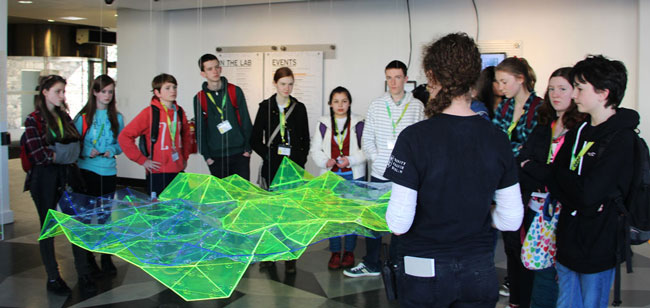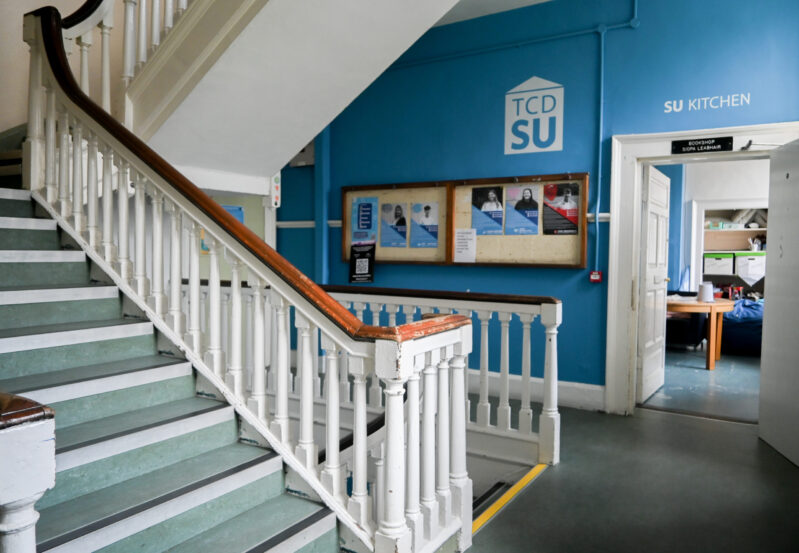The areas of science, technology, engineering and mathematics (Stem) are forces which are constantly changing the world around us. They have constructed our modern reality and will continue to evolve it for centuries to come. Stem is everywhere – the phone in your hand, the aircraft above your head, the social networks you live your life on. Behind every computer screen, every Google search, every iOS update, there is a team of Stem scientists and researchers whose commitment to change and innovation is the locomotive driving our world. Our planet needs these thinkers and creators to thrive. For this reason, inspiring and allowing young people to engage with Stem has never been more essential, and the Trinity Walton Club is doing exactly that.
Founded in 2014 by Prof Igor Shvets and Prof Arlene O’Neill, both of Trinity’s School of Physics, the Trinity Walton Club is a cross-school collaboration between the School of Physics, the School of Mathematics and the School of Education. It was designed to serve as the ultimate hub for second-level students with a passion for Stem. In 2014, second-year students from 20 different schools were invited to sit an entrance assessment. Based on this assessment and a personal statement, 60 students were offered a place on the programme. Dubbed the “W1” group, these students were given a weekend golden ticket, granting them access to Trinity’s Stem departments – the departments that are turning ideas of pure imagination into a reality.
We are not a grinds school. We are not here to get anybody an A in a school subject
Speaking to The University Times, Prof Arlene O’Neill, the programme’s director, outlines this process: “The idea at the beginning was to leverage the university’s resources, people, buildings and equipment and to use it all at the weekend to support second level students.” They hoped that by allowing students to “step into the shoes of a scientist, mathematician, engineer or technologist” and work on “projects of real world significance”, the Walton Club would generate a wave of young “scientifically grounded” innovators who were “not afraid to fail”. “It is much broader than giving them an understanding of differentiation or an understanding of how to code”, O’Neill explains. “We are not a grinds school. We are not here to get anybody an A in a school subject. It is a more skills-based programme, to try and get them to see the world differently and to engage in Stem conversation.” Since the enrolment of the W1 group in 2014, the Walton Club’s success has grown exponentially. Now, every Saturday, the School of Physics opens its doors to 220 students from all across Ireland. “What we have actually created”, admits O’Neill, “is something far more significant than we ever intended”.
The Walton Club is named after Irish Nobel laureate Ernest Walton. In 1951, Walton won the Nobel Prize in physics, with British physicist John Cockcroft, for successfully splitting the nucleus of the atom. The pair knew their experiment had been successful when they identified tiny sparks in their particle accelerated chamber. These sparks were alpha particles – particles emitted following the splitting of the atomic nucleus. In the spirit of this breakthrough, students of the Walton Club are called alphas. Every Saturday for three hours, the alphas engage in a variety of Stem activities and work closely with a committed group of Stem PhD and undergraduate students. These academics work as lead educators and teaching assistants on the programme and are free to create lesson plans based on their own research and interests. “We can take [the students] to levels that are just not possible, due to limitations in time and curriculum constraints within the school system”, notes O’Neill. “We have a lot of flexibility. We don’t have State exams to comply to.”
Speaking to The University Times, Jason DM Botha, a PhD student in the Department of Mechanical and Manufacturing Engineering, expressed a similar sentiment. Botha’s lesson plans include aspects of “mechanical engineering, civil engineering and aeronautical engineering”. He notes that the moment when an alpha grasps a “concept that even university graduates aren’t able to understand”, it makes it all worthwhile. “You see their eyes light up”, Botha explains. “They get this sort of smile on their faces when they realise that what you are explaining to them, actually makes sense.”
At the end of each year, the alphas host a showcase for their parents in order to display their projects and voice their learning. Last year, the event was attended by approximately 400 people, including Provost Patrick Prendergast. “Their projects are phenomenal”, notes O’Neill. “The things that [the alphas] do would challenge the best undergrads.” Speaking to The University Times, Michael Cullinan, a lead educator on the programme, praised the alpha’s projects and states that “a lot of them would be projects that [he] would quite like to do”. “Seeing the pride that they had in their projects was quite rewarding”, he adds. However, this year, the Walton Club is taking a new direction. Partnering with Prof Kevin Kelly, Prof Aline Vidotto and Prof Jan Manschot, the W3 group of alphas will undertake a Stem research project, addressing a societal challenge under the theme of “healthy living”. “It is a real research project”, highlights O’Neill. “The alphas are partnering with organisations and are trying to identify users for this research. In some cases, they are devising prototypes. In some cases, they have apps. This is a real shift from how we have done the projects before.”
Despite this change, the Walton Club’s greatest new venture will take place during the summer of 2017. Aside from its Saturday programmes, the club runs various Stem-focused summer camps during June, July and August. As O’Neill explains, the camps are “bite-sized opportunities to come into Trinity for a week or two, and develop STEM”. These camps have previously been for Irish students, with those who were not accepted into the Saturday programme being offered places first. In 2017, however, Trinity’s Walton Club will welcome 200 international students to the summer programmes, something O’Neill admits is a big task: “This is going to be a huge leap for us because we need to provide a residential component. We are also going to provide culture and heritage for the American students and the other non-national students while they are here in Ireland.” Overall, they believe that the culturally diverse environment will bring about great collaboration and will put Ireland on the map as a country that is driving Stem research. “We are leaders in research in areas such as nanotechnology”, explains O’Neill. “We want to leverage that and showcase that. We are not just a little island.”
Where will they go? What will they do? Do we have a Nobel laureate? Do we have a president of Ireland? One that has a Stem voice?
Ensuring that every student has the opportunity to join the Walton Club is an endeavour that is high on the club’s priority list. Of all the places available in the program, 15 percent of them are allocated for DEIS school students and students from socio-economically deprived backgrounds. The Walton Club is a not-for-profit organisation, however it is still self financed and alphas are required to pay fees. Aware that not all students are in the position to afford these fees, the Walton Club aims to combat this. “We never wanted finance to ever be a limiting factor for any student”, O’Neill explains. “We always look at strategies to help out parents and students on the programme.”
Gender quotas have also been put in place to ensure that both the alphas and the educators are groups of 50 per cent male and 50 per cent female. As an advocate for women in Stem, O’Neill believes that these quotas will help challenge the perception that “science, technology and maths is for boys only”. “There is a great saying, ‘you cannot be what you cannot see’”, says O’Neill. “If you don’t know a female physicist, you may never believe that role exists.” However, maintaining these gender quotas has been a challenge for the Walton Club due to the lack of women in Stem. Eager to amend this, O’Neill encourages any female academics within Trinity’s Stem disciplines to reach out to the Walton Club and get involved.
From their initial enrolment, alphas can spend up to four years with the Walton Club and progress from the W1 group to the W4 group with the hope that they will return during their undergraduate degrees to work as mentors to younger alphas. Much like the sparks in Ernest Walton’s particle accelerated chamber, these young alphas are the sparks that will ignite future Stem conversation and innovation in Ireland. Speaking to The University Times, Patrick Okolo, a teaching assistant on the programme, commended the alphas for always asking “intriguing and mind-provoking questions”. “An alpha once asked me if it was possible to redesign an aircraft”, explains Okolo, “so that instead of an aircraft having two wings it would have four, to make it fly faster”. This enthusiasm, coupled with the wonderful work of the Walton Club, will not just equip the alphas with knowledge, but with the confidence and assurance that they can change the world. After all, they are “the creators of tomorrow”. “An importance piece of all this will be to track them”, says O’Neill. “Where will they go? What will they do? Do we have a Nobel laureate? Do we have a president of Ireland? One that has a Stem voice?”







